Belle Gibson's wellness scam was a warning 🥗
Of course we have opinions about Netflix series Apple Cider Vinegar...
In 2015, Australian wellness influencer Belle Gibson had a large social following, a best-selling app and cookbook, and was considered a global media darling for her story of overcoming terminal brain cancer with a healthy lifestyle.
Just after the publication of her book, and as her app The Whole Pantry was about to be in-built as a value add for people purchasing an Apple Watch, she suffered a spectacular fall from grace when it emerged she’d never actually had cancer.
A decade on, a new Netflix series starring Kaitlyn Dever (doing an Aussie accent that puts Meryl Streep to shame) has resurfaced a lot of emotions for many - Ensemble co-founder Rebecca included.
Back in 2013, when I was in the wellness era of my cancer journey, I downloaded The Whole Pantry app and followed Belle Gibson, Jessica Ainscough (aka the Wellness Warrior) and a raft of other wellness influencers who promised to hold the key to eternal health.
Their secret? Put into the world, and your body, what you wish to get out of it. It’s called manifestation, yo: if you don’t get what you want out of life, you clearly don’t want it badly enough!
Of course, while you’re there you’ll need to manifest wealth also: organic nuts for milking, dried superfoods from South America, blenders and juicers don’t come cheap; all are ‘necessary’ to live a life of optimal health and longevity.
The goal of my wellness era wasn’t to beat cancer. I’d done that 10 years prior thanks to a mastectomy, chemotherapy, radiotherapy and hormone treatment. AKA everything modern medicine could throw at a young woman who’d inexplicably been diagnosed like a bolt out of the blue.
I was now living my best organic granola life to give myself the greatest chance against it returning. I was in the weird limbo place of ‘well’ but traumatised. My immune system had taken a battering from my lifesaving meds, and two ‘medical mishaps’ - false alarms where I had been told by my oncology team my cancer had returned as a secondary, including one when I was 35 weeks pregnant - had left me with so much anxiety, I couldn’t tell if the pain in my shoulders was stress-induced or metastasised bone cancer.
I believed so wholeheartedly in the mindbody connection, and the healing powers of whole foods and exercise, that I opened a yoga and meditation centre above a raw food cafe, with a free weekly class for people with cancer. I was a beacon of good health, the model ex-cancer patient who could allay some of the fears of attendees. It was literally my full-time job to have a daily yoga practice and drink green smoothies but it was not a job that proved financially viable in the long run.
I still believe just as fervently that eating well and regular exercise are good for my mind and body, however for most of the past few years my full-time job has been working in a toxic industry under fluorescent lighting amid ongoing restructures. #Balance.
New Netflix series Apple Cider Vinegar openly plays with the truth: each episode starts with a different character breaking the fourth wall to explain it is a true-ish story that’s based on a lie. Those who aren’t intimately familiar with the story of Belle Gibson, cancer grifter and arguably the ‘best’ wellness scammer of our generation (I write this on the day renowned conspiracy theorist RFK Jr had been elected US health chief), may be surprised to learn that a lot of what’s portrayed by her character is true.
The other characters are composites and plot devices, although Milla Blake is clearly based on Jessica Ainscough, a former digital editor at Dolly magazine who decided against amputation and conventional medicine for her rare soft-tissue cancer, instead turning to Gerson Therapy (which includes 13 raw juices and up to five coffee enemas a day), embarking on speaking tours and selling books on her incredible recovery until she – spoiler alert – died seven years later.
The fact that both Belle and Jess were genetically #blessed in a way that calls to mind the Wakefield twins (a point emphasised by Milla reading Sweet Valley High as cosy comfort fodder as she lay dying, next to a cat she’d named Lila Fowler) is a large part of what gave them such dangerous ‘influence’. It’s worth noting: Elle Macpherson and Gwyneth Paltrow do not hold any qualifications in healthcare.
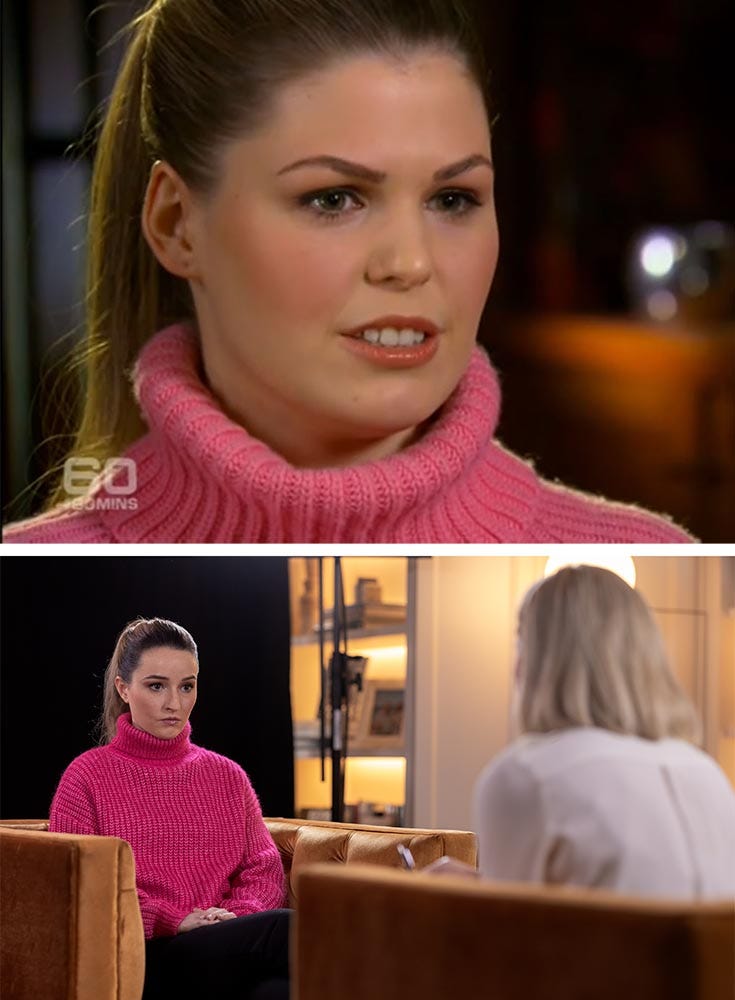
Apple Cider Vinegar (or ACV, as the oft-touted product is affectionately known to those in the wellness biz) shows the impact of a cancer diagnosis on people of differing ideologies.
One of the characters conceptualised to drive the narrative forward, Lucy, freshly diagnosed with breast cancer and undergoing gruelling rounds of chemotherapy, is inspired by Belle’s incredible recovery and wishes to stop conventional treatment in favour of travelling to Peru for Ayahuasca therapy.
The only thing is, she’s married to one of the two journalists trying to break the story of Belle’s lies for The Age and he’s not keen (again, this is a plot device – the real reporter’s wife did not have cancer). “I don’t want you to die, is that so unreasonable?” he begs. “That’s not about me,” she explains gently, “that’s about you.”
Lucy does go to Peru and interestingly, when one of the sharmans asks what she wants to achieve, she doesn’t ask for a cure; rather she asks to find peace. After a wild ‘trip’ in the bush sees her closer to the solace she craves, she asks to extend her stay. “Of course,” says the shaman, full of compassion. Then, reaching behind them to get a portable Eftpos machine, “would you like that charged in Australian dollars?”
Therein lies the crux at the heart of most ‘wellness’. Follow the money trail. Most of the wellness influencers who make the biggest noise about ‘Big Pharma’ hawk products and services of their own. In 2025 the global wellness industry is worth over NZD$11 Trillion.
Belle was certainly very invested in using fear to sell her products. If anything, ACV underplays this aspect of her work: she was adamant that she owed her life to her lifestyle and touched on common conspiracy theories, suggesting her cancer was caused by vaccinations and fluoridated water. Presenting as the epitome of good health, she was a tremendous advertisement for her program, which you could download for NZD$4.20
From what I remember of The Whole Pantry, the recipes were good. And, as an employee says in the show, “she has great taste in fonts”. She was made for success in the early influencer era. The silly girl should’ve claimed her diet healed her eczema, or a vague autoimmune disease, but she had to go all in on the cancer. (ACV showrunner Samantha Strauss says she purposely doesn’t address or speculate on Belle’s mental health or any personality disorders she may or may not have).
Belle’s initial fall from grace started with charity fraud; the first reportable facts those chasing her were able to print. I suspect the fact she literally stole from people is what’s made her behaviour so unforgivable; let’s face it, everyone from the Medical Medium and his celery juice to Wim Hof, Pete Evans and Joe Rogan make outlandish claims and none of them are persona non grata. (Yes, as portrayed in the show, one of those she purported to raise funds for was a young boy with terminal brain cancer who never got a cent and whose family was subjected to abuse when her lies were exposed).
Jessica Ainscough died of cancer the week before Belle’s charity fraud was exposed and her lies started to catch up with her. I have empathy for Jessica, who in real life was presumably oblivious to Belle’s lies and was no doubt left wondering why her cancer had returned when Belle’s had not. Perhaps she wondered if she’d just not manifested wellness hard enough. I imagine she also felt she’d let down her followers, and supporters.
That’s the thing about cancer returning, spoken not as someone who’s experienced it but as someone who has been - if I can say this without sounding like a dickhead - an important resource for many upon diagnosis. If I can present with my two (post-cancer) children, my long hair and my real-life lived experience that reassurance to others now encompasses so much more than just disease.
But if something were to change in the future? I’ve worked hard to accept that could happen, and if it did, it would be no fault of mine. But I know it would shake many to the core and that’s a large responsibility to carry. My heart aches for Jessica. Not the Milla in the show, who is portrayed as competitive and a bit mean, but for the person who sought answers in all the wrong places and watched someone she thought was in the same boat thriving, while she was ultimately dying.
A dear friend of mine, diagnosed at the same time as me but with a more advanced prognosis, stopped conventional treatment and went to see a spiritual healer in Brazil. She returned unhealed and exhausted by the travel, and died shortly afterwards. As such, I found the scenes of Milla taking her mother to Mexico harrowing to watch. But as with the character of Lucy, I feel intense empathy for anyone forced to make any decisions on their health. These decisions are deeply personal and I respect that. They are also made from a place of fear that I completely inhabit.
What I don’t respect is people using their platforms to have undue influence over the decision making of others. It’s worth noting that the healer my friend visited was subsequently found guilty of an alarming number of sexual abuse charges and will remain in prison for the rest of his life.
Another character in the show, Chanelle, is portrayed (by Kat from The Bold Type!) as being in the middle of the rivalry between Belle and Milla – as Milla’s BFF turned manager who defects to the influencer with the larger following before becoming suspicious of her story and approaching the journalists who would go one to break the story.
In reality this character is Belle’s friend Chanelle McAuliffe who did start to doubt Belle after someone else in her life was diagnosed with cancer and presented extremely differently. Chanelle did attempt to stage an intervention, and ultimately served as a whistleblower.
Despicable as Belle’s lies were, the media was complicit in mainstreaming them. Cosmopolitan magazine famously presented Belle with their ‘Fun and Fearless’ award right before she was exposed (presumably because she made cancer look fun… and was fearless? Soz to all you sad sacks out there scared of dying of cancer!) and were afterwards sent an anonymous letter asking them to investigate her, which they disregarded.
Countless other media outlets did no due diligence ahead of interviews. Most gallingly, Penguin, publisher of Belle’s book, appears to have done absolutely no fact checking and, as shown in the show, right ahead of publication developed an inkling things weren’t right and booked her in for media training - some of which is available online and is every bit as cringe as we saw on the show (even more so if you consider the golden turmeric latte Belle is sipping throughout).
The media gave a monster (or, perhaps, a mentally unwell person) a pedestal without doing a shred of due diligence into her credibility, and then bayed for blood when she turned out to be a fraud. In the case of 60 Minutes and that iconic interview with Tara Brown, they bayed for blood and paid her AUD$75k.
The content creator became the content. Today, the content keeps on coming.


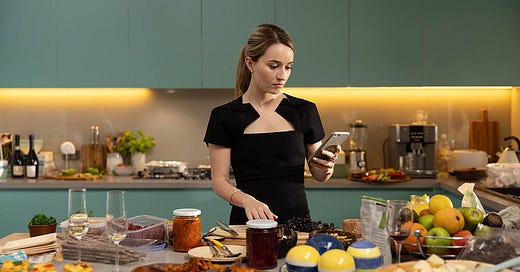




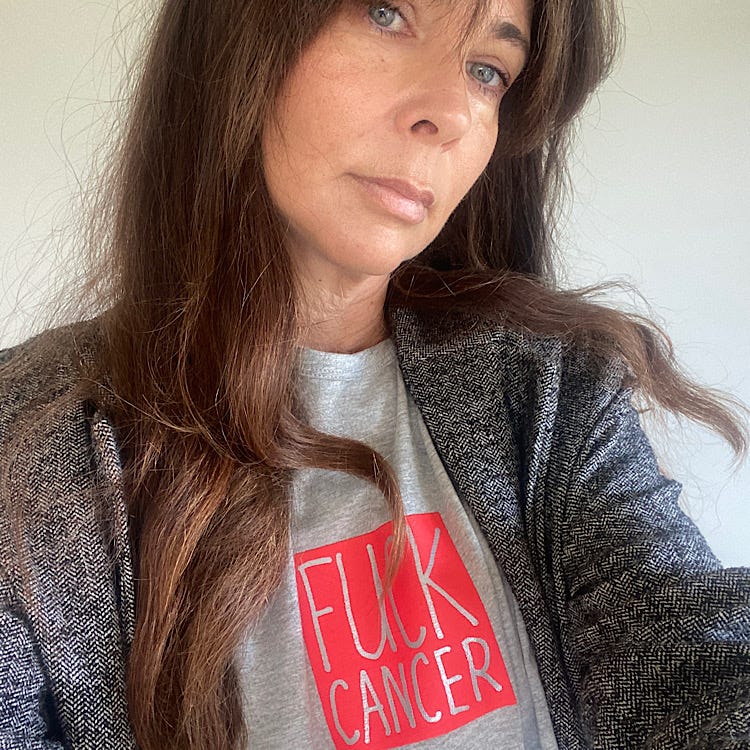
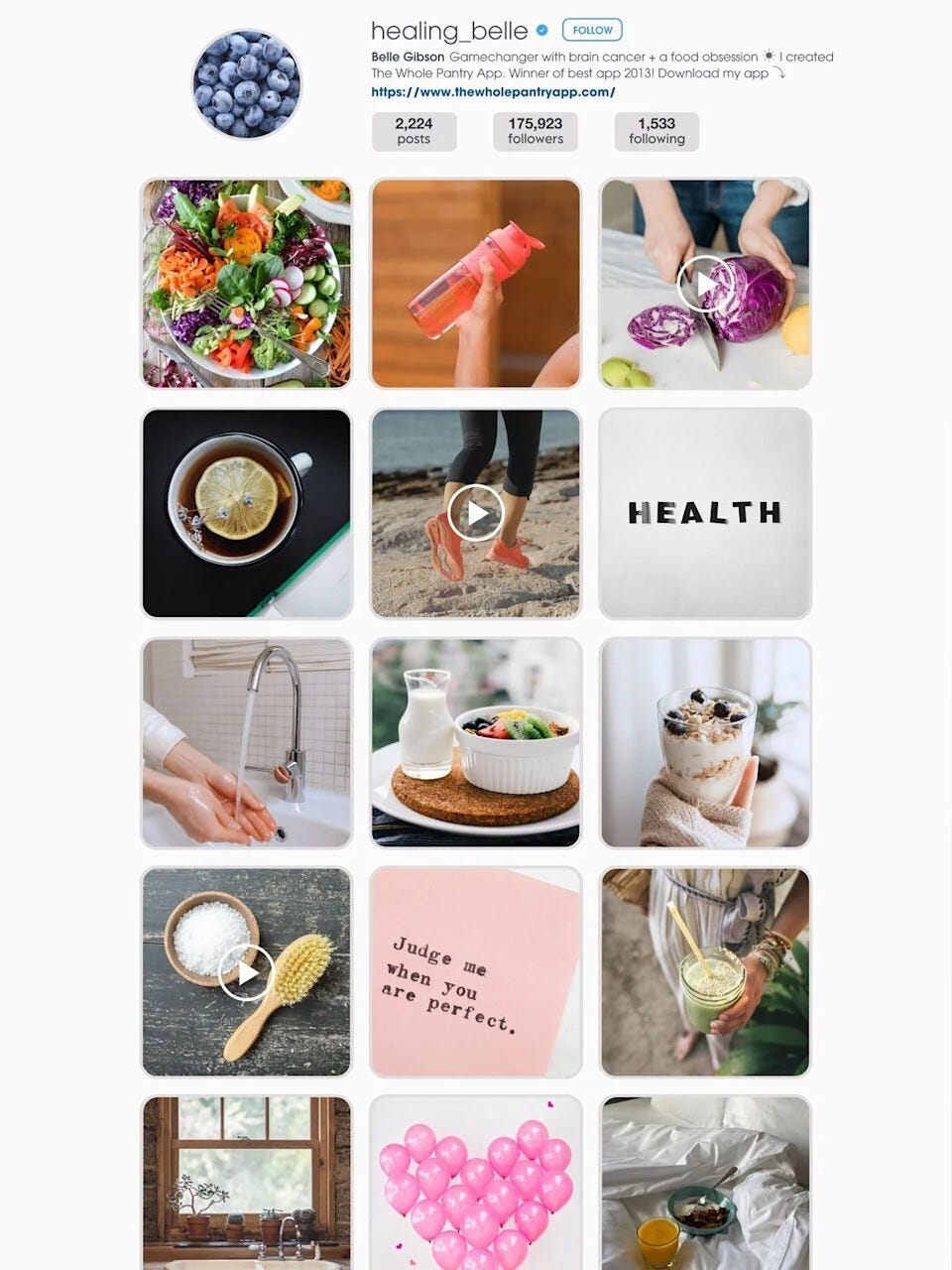
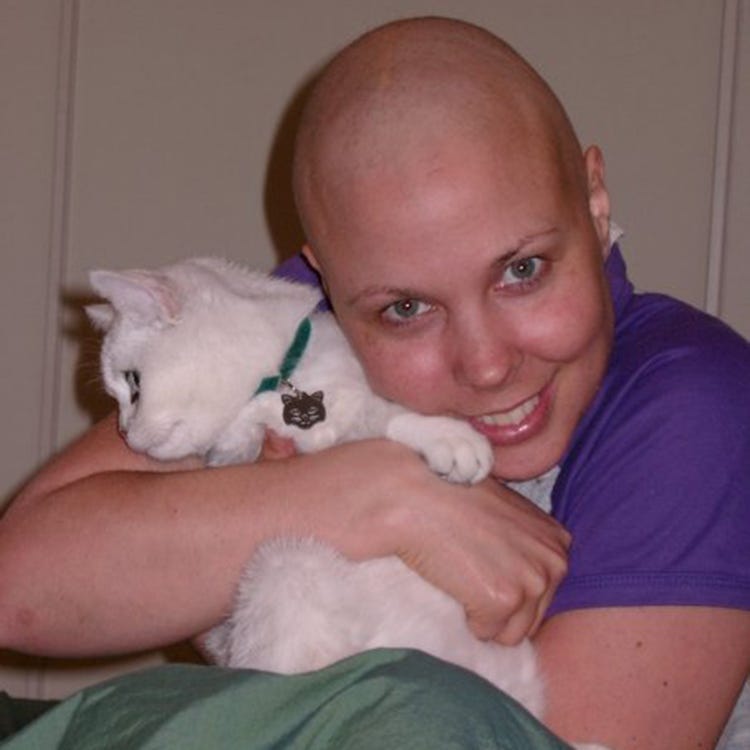
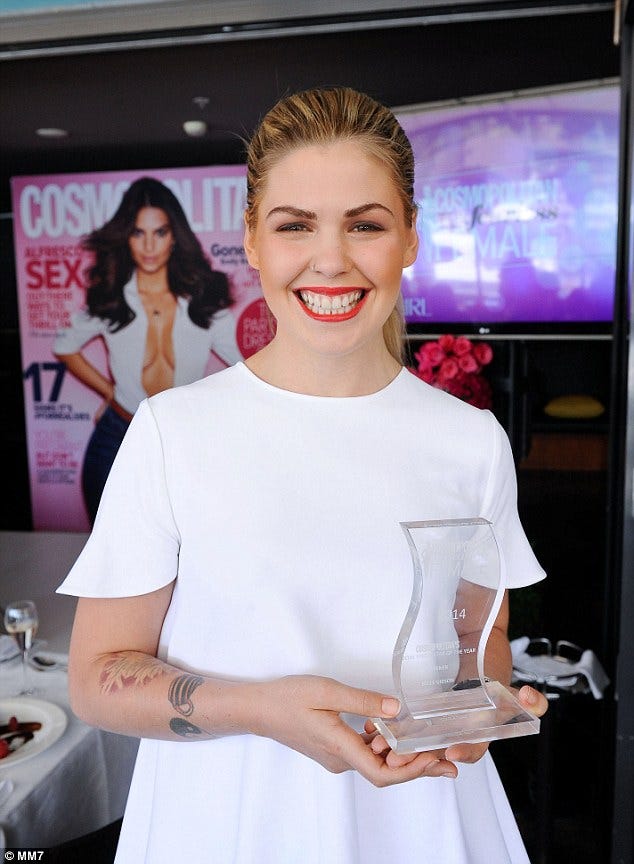
In 2013/14 I was going through the decline of my marriage and found Jess. I downloaded Make Peace With Your Plate and thought she really seemed to have life sorted—it was truly a strange time to imagine in 2025—when manifestation magic was possible and I was just about to take my 200 hr YTT and change my life. #blessed amirite?
People never mention it, but the Wellness Warrior website had great content. The aesthetic seems dated now but she seemed sincere and attracted interesting people I was interested in knowing more about. The biggest red flag I see now when I visit it in the Wayback Machine is the B-School mentions (imho, problematic).
When Jess died so suddenly it was like they erased her, and all her official content disappeared. I know it might have been difficult for those her loved her but maybe being honest about how her illness played out w/out the typical medical interventions would have helped others.
As a mom, much older now, all I really think about is how she was so young. I think she really believed all the stuff she did/ate/thought really would save her.
Belle just seems truly unwell mentally. I’m not sure that story will ever make sense as she took such INSANE risks with her lies.
This is all so bang on, Rebecca. I felt, and feel, every word of it. The idea that we are responsible for healing ourselves; to lead a 'good' healthy cancer-free life, we just have to want it bad enough is so toxic. And if we get sick, or cancer returns, did we just not try hard enough. If we are responsible for healing ourselves, are we also responsible for getting cancer in the first place? Ugh. It's a lot.